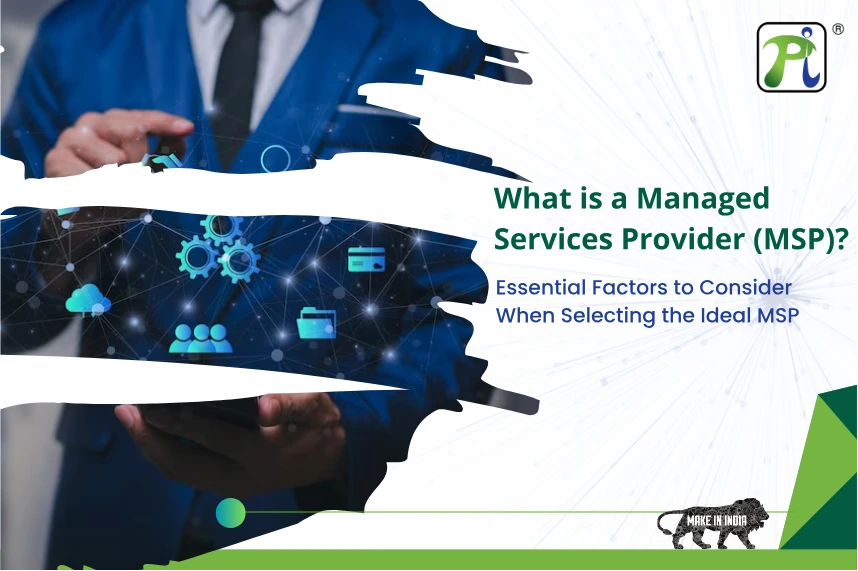We Will Get Back To You As Soon As Possible


Professionals in the field of remote IT infrastructure and service management are referred to as Managed Service Providers (MSPs). By providing consistent and dependable support, they extend an extensive array of services, including infrastructure, application, network, and security management. MSPs offer an array of IT management services, including network and infrastructure management, security, monitoring, and maintenance. This allows customer organizations to prioritize enhancing their services without worrying about the technical aspects. These providers offer an extensive suite of advantages, including enhanced security, increased efficiency, cost savings, flexibility, scalability, access to unparalleled technical and industry expertise, and the ability to fill talent gaps. The MSP market is poised for substantial growth as more and more small and medium-sized businesses (SMBs) are turning to outsourcing for their non-core IT systems and functions. A considerable number of Managed Service Providers (MSPs) function using a subscription-based pricing framework, wherein they deliver continuous services that are customized to assist their clients' enterprises in specific ways.
The role of an MSP is to efficiently manage IT systems for organizations, ensuring minimal downtime and addressing security concerns. They provide continuous assistance with network security, data backups, technical support, and system maintenance and repair. MSPs are becoming more and more sought-after as strategic outsourcing partners who provide remote IT services and management. This is due to the expertise and advanced technologies that many businesses do not possess.
Active administration and ongoing support are provided either at the client's location, in their own data center, or in a third-party data center. Hardware, software, or cloud technology may also be incorporated into their product or service offerings. Managed service providers (MSPs) undertake the duty of overseeing particular IT systems and functions on behalf of their clients. They demonstrate proactive management by utilizing either remote cloud-based solutions or on-site presence.
The utilization of the services of a Managed Service Provider (MSP) offers a multitude of benefits, including:
MSPs, including human resources, accounting, and IT, are experts in their respective fields. They provide insightful guidance and are exceptionally knowledgeable in their field, capable of managing a vast array of responsibilities.
Businesses can benefit from the expertise of Managed Service Providers (MSPs), who provide access to state-of-the-art infrastructure and technology. This enables businesses to stay ahead of the competition and improve their overall efficiency. They offer training sessions to the staff regarding the new systems.
Engaging the services of a Managed Service Provider (MSP) can result in significant cost savings when compared to the expenses associated with maintaining in-house departments. Managed service providers often work on a subscription-based model, which helps businesses plan and budget for their IT expenses. A study revealed that 50% of organizations that utilized the services of an MSP reduced their annual IT expenditures by 1-24%, 33% by 25–49%, and 13% by more than 50%.
MSPs ensure that systems are monitored around the clock and provide immediate assistance in case of system breakdowns, minimizing downtime and potential losses.
By entrusting tasks to an MSP, businesses can prioritize core activities, decision-making, and strategic growth, leaving the MSP to manage day-to-day IT operations.
MSPs are equipped with the latest cybersecurity tools and technologies to protect businesses from a wide range of threats, providing proactive monitoring and immediate action to mitigate risks.
Managed Service Providers provide flexible solutions that can easily adapt to the needs of a growing business, enabling swift and effective modifications to the IT infrastructure.
By collaborating with an MSP, businesses can benefit from the expertise of a team of IT professionals who possess a diverse range of knowledge and skills. This enables them to utilize the most efficient and effective IT solutions available.
These advantages make hiring an MSP a compelling choice for businesses seeking to enhance their IT management, lower expenses, and bolster their overall effectiveness and security.
When selecting the ideal Managed Service Provider (MSP), it is important to take into account the following criteria:

It is important to make sure that the MSP has a wide range of specialized skills that go beyond basic IT maintenance. This includes having expertise in end-to-end capabilities, security, cloud technology, and cross-platform integration.
Seek out an MSP that prioritizes staying ahead of potential issues and enabling clients to consistently enhance their operations. Utilizing advanced technologies to enhance visibility and automate workload prioritization would be highly beneficial.
Evaluate the MSP's expertise in managing diverse cloud environments, including multiple vendors and hybrid setups, as well as their established partnerships with top cloud providers.
Opt for an MSP that offers a diverse range of managed services, such as application management, managed cloud, managed security, and managed IT infrastructure services. Additionally, it's important to confirm that they provide a high level of professionalism and are willing to accommodate your business needs. Look for companies that offer flexible options, like the ability to avoid vendor lock-in and pay-as-you-go pricing models.
Choose an MSP that values accountability and is dedicated to delivering on performance-based service-level agreements (SLAs). They should be willing to enforce these commitments through fines or other consequences if they are not fulfilled.
Consider an MSP with extensive global reach and capabilities, providing advantages like managing client projects across multiple nations, offering local language support, and ensuring compliance with local regulations.
Furthermore, take into account the following suggestions when selecting an MSP:
By taking into account these factors and suggestions, you can make a well-informed choice when selecting the most suitable MSP for your business.
A Managed Service Provider (MSP) is an organization that provides businesses with IT support and services, whereas a Managed Security Service Provider (MSSP) specializes in delivering security services to organizations. Although Managed Service Providers (MSPs) may offer security services as part of their overall portfolio, they are not considered security service providers (MSSPs), who are dedicated to providing security services exclusively. Vulnerability management, threat detection and response, and compliance management are all included in these services. MSSPs employ specialists in the domains of security and cutting-edge technologies to ensure the protection of their clients' data and networks. MSPs, on the other hand, are capable of offering an extensive range of services, including security services, network and infrastructure management, application management, and cloud services. It is critical to select a provider with a comprehensive understanding of the differences between MSPs and MSSPs in order to guarantee that the specific needs of your business are adequately catered to.
In conclusion, Managed Service Providers (MSPs) offer an extensive array of benefits. The aforementioned benefits encompass the utilization of specialized services, cutting-edge infrastructure, economical pricing, timely responses, autonomy to focus on critical assignments, enhanced information technology security, and flexibility to readily accommodate evolving requirements. When selecting an MSP, it's crucial to take into account various factors. These include the MSP's skillset and expertise, their proactive approach, their support for all clouds, their portfolio and flexibility, their performance-based SLAs, and their global reach with local expertise. In addition, it is important for businesses to distinguish between MSPs and Managed Security Service Providers (MSSPs) in order to ensure that their unique requirements are fulfilled. By thoroughly evaluating these factors, organizations can make well-informed decisions when choosing an MSP, which will ultimately result in better IT management, cost-effectiveness, and heightened security.
Questions? We're here to help.
©2026 Pi DATACENTERS® Pvt. Ltd. All rights reserved
